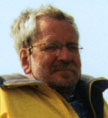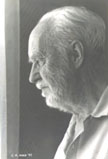Significance!
 |
About the presenter: Anders Lundberg writes, "I'm 56, and have been stuttering the last 53 years, now to a comfortable degree. Working as a clinical psychologist, specializing in stuttering, for 28 years, and have been combining an SLP-education with a psychologist's. Concentrating on the clinical settings and encounters now after also being active in organizations in stuttering and speech pathology; former lecturer at the University of Göteborg, former president of the Swedish Association of Logopedics and Phoniatrics (SFFL), former president of the Scandinavian Co-operation Council of Logopedics and Phoniatrics (NSLF) and former member of the Fluency Committee of the International Association of Logopedics and Phoniatrics (IALP)." |
 |
About the presenter Charles Van Riper was born in Champion, Mich., December 1, 1905. He earned a B.A., Univ. Michigan, Master's Degree at the University of Michigan, specializing in Olde English Literature and Elizabethan Ballads; and Ph.D. in Clinical Psychology from the University of Iowa, He was a Member, Amer. Speech and Hearing Assoc. (Fellow, 1933; Associate Editor, 1939; Councilor, 1950-52). In 1936 he established one of the nation's first speech clinics at Western Michigan in Kalamazoo, which he directed until 1967 when he was appointed Distinguished University Professor, a position he held until his retirement in 1976. He died September 25, 1994. |
Significance
by Anders Lundberg (and Charles Van Riper)
from Sweden
What makes a significant moment significant is the great personal impact the moment has. Meeting Dr Charles Van Riper, Doctor Van, for the first time carried such a tremendous impact for me; so much so that the vibrations from that impact are significantly still active. And we're talking about an event, more than thirty years ago.
But let's begin at the beginning of that special moment of my life.
I was in Michigan as it was, for quite other reasons than my stuttering. It was Christmas, snowy and cold. I was involved in educational research at the time, pursuing a career in Educational planning and Educational Technology. Stuttering for sure; at a degree that had made me give up on myself as a talking individual and I was next to silent for nine years. A few years before meeting Doctor Van and with great aid from an MD in Sweden, Björn Fritzell, I came to realize that I had to be a talking human, and I had started on that road of oral language I have been walking ever since. Too much and loudly, say some... I founded the first local chapter in the "Stutterers' Movement" outside our capital, and I was in fact beginning to be a kind of authority on stuttering in Sweden, which says something about the quality of knowledge of stuttering in our country at that time! So, very little avoidance, very much stuttering, very aggressive -- the aggressiveness covering the deep deep fear and panic I would encounter being less angry. But I did scare people away from attacking or even questioning me openly by that, and I could use the aggressiveness in my intended career as well.
Fritzell knew Courtney Stromsta well, and knowing I was going to Michigan over Christmas and New Year's, he had secretly alerted Stromsta in Michigan about my visit. Then, one afternoon, the telephone rang in Kawkawlin (No sir, no stuttering, the village's name it is), and somebody named Stromsta wanted to talk to me and invited me to come for two days to the clinic in Kalamazoo. I got a car and skidded down to Kalamazoo on icy roads the best I could. Stromsta greeted me warmly and then turned my insides into jelly when rushing on, telling me that "Van Riper was expecting us in half an hour". I thought my last moments had come, because there were rumors that Van was tough, almost inhuman and demanding to the limit of life and death.
Knocking at the door at the old farm-house in Portage, the voice from inside was no growl, no thunder, the door did not explode at all, but was nicely opened by a white haired woman, smiling and bidding me warmly welcome with "Anders, wasn't it, Van is inside there" and pointed. Gee, there was an aroma of freshly baked cinnamon rolls and coffee, no blood, no gunpowder, no sparkling, blinking and flashing DAF-machine waiting to hook up another victim. Opening the assigned door, I met a beaming elderly and tall man and, from what I later learned, a Flame Symphony enlightening and heating the room. Before I even began blocking, a tray with those rolls and coffee arrived. I just stood there, and Van shook my hand saying "Doctor Van." Trying to introduce myself I blocked like crazy. He laughed out loud in the middle of that block (no one dared do THAT at home!) and said "ah, good, a member of the clan, eh?. Sit down, let's hear, what brought you all this way?". And how we talked (I had read Speech Correction, The Nature of Stuttering and a lot of other literature about stuttering before).
Another speech clinician from Sweden, Lennart Larsson and I interviewed Charles Van Riper in 1975. For those who have not read a lot about Van Riper's philosophy of stuttering and stuttering therapy, the audio recording below of this conversation will provide a glimpse. If you are unable to open it, I'd suggest reading some of the books like the two I just mentioned. (IMPORTANT: please note the size of each of the files). All the files below are of the same interview, so you only need to open one of them.
(Interview With Charles Van Riper by Lennart Larsson and Anders Lundberg, 1975. The audiotape was sent by Ed Feuer, and is placed online with the help of MSU, Mankato tech staff and with the permission of Larsson and Lundberg.)
Back on that first day I met him nearly 30 years ago, after we had been talking for a long time, Dr. Van interrupted me. I didn't need a block of mine for that though! "You'd better study here for a while, eh?". There and at that moment I decided what was the turning point of my life -- yes, I was to return, to that couple, to that house and to that mysterious disorder, since I myself was insignificant, but the deed of mine could make a difference.
Time passed by and I acted according to the decision of that moment. I have never opened another book on Educational Technlogy since then, but have read many books about stuttering, writing two myself so far. And how many "clan members" have I seen and heard and discussed with during nearly 30 years of clinical practice? Finally when Van (he even told me to drop the "Doc") one day appointed me his grandson (saying, "Your children you'll always try to change, but grandchildren you just love"), I felt the greatest pride. Trying to copy him, then? Yes, in one little aspect: "Don't do as I do, do what you do". A good lesson in originality. Impact, anybody?
July 30, 2003

